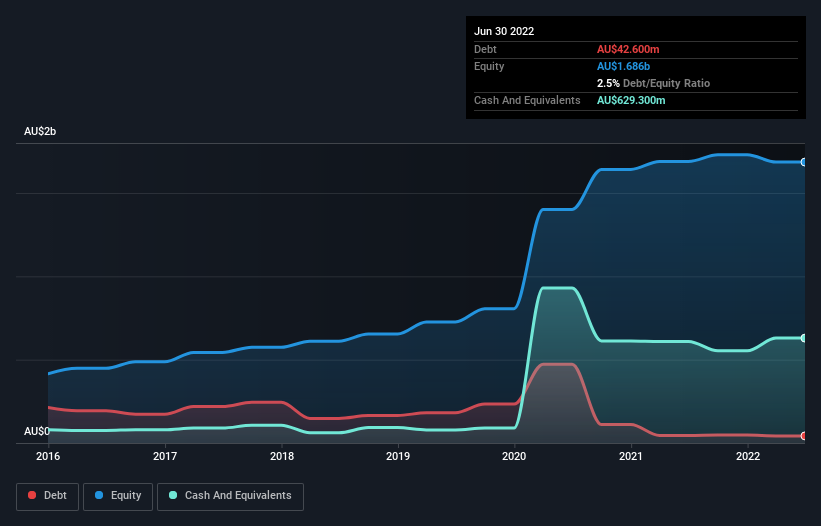
Legendary fund manager Li Lu (who Charlie Munger backed) once said, 'The biggest investment risk is not the volatility of prices, but whether you will suffer a permanent loss of capital.' When we think about how risky a company is, we always like to look at its use of debt, since debt overload can lead to ruin. As with many other companies Cochlear Limited (ASX:COH) makes use of debt. But is this debt a concern to shareholders?
What Risk Does Debt Bring?
Debt is a tool to help businesses grow, but if a business is incapable of paying off its lenders, then it exists at their mercy. If things get really bad, the lenders can take control of the business. While that is not too common, we often do see indebted companies permanently diluting shareholders because lenders force them to raise capital at a distressed price. Of course, the upside of debt is that it often represents cheap capital, especially when it replaces dilution in a company with the ability to reinvest at high rates of return. The first thing to do when considering how much debt a business uses is to look at its cash and debt together.
See our latest analysis for Cochlear
How Much Debt Does Cochlear Carry?
As you can see below, Cochlear had AU$42.6m of debt at June 2022, down from AU$45.0m a year prior. But it also has AU$629.3m in cash to offset that, meaning it has AU$586.7m net cash.

How Healthy Is Cochlear's Balance Sheet?
According to the last reported balance sheet, Cochlear had liabilities of AU$527.6m due within 12 months, and liabilities of AU$251.8m due beyond 12 months. Offsetting these obligations, it had cash of AU$629.3m as well as receivables valued at AU$390.4m due within 12 months. So it actually has AU$240.3m more liquid assets than total liabilities.
This state of affairs indicates that Cochlear's balance sheet looks quite solid, as its total liabilities are just about equal to its liquid assets. So while it's hard to imagine that the AU$13.4b company is struggling for cash, we still think it's worth monitoring its balance sheet. Succinctly put, Cochlear boasts net cash, so it's fair to say it does not have a heavy debt load!
Also good is that Cochlear grew its EBIT at 12% over the last year, further increasing its ability to manage debt. The balance sheet is clearly the area to focus on when you are analysing debt. But it is future earnings, more than anything, that will determine Cochlear's ability to maintain a healthy balance sheet going forward. So if you want to see what the professionals think, you might find this free report on analyst profit forecasts to be interesting.
Finally, while the tax-man may adore accounting profits, lenders only accept cold hard cash. While Cochlear has net cash on its balance sheet, it's still worth taking a look at its ability to convert earnings before interest and tax (EBIT) to free cash flow, to help us understand how quickly it is building (or eroding) that cash balance. In the last three years, Cochlear's free cash flow amounted to 22% of its EBIT, less than we'd expect. That weak cash conversion makes it more difficult to handle indebtedness.
Summing Up
While we empathize with investors who find debt concerning, you should keep in mind that Cochlear has net cash of AU$586.7m, as well as more liquid assets than liabilities. And it also grew its EBIT by 12% over the last year. So we don't think Cochlear's use of debt is risky. Over time, share prices tend to follow earnings per share, so if you're interested in Cochlear, you may well want to click here to check an interactive graph of its earnings per share history.
If you're interested in investing in businesses that can grow profits without the burden of debt, then check out this free list of growing businesses that have net cash on the balance sheet.
If you're looking to trade Cochlear, open an account with the lowest-cost platform trusted by professionals, Interactive Brokers.
With clients in over 200 countries and territories, and access to 160 markets, IBKR lets you trade stocks, options, futures, forex, bonds and funds from a single integrated account.
Enjoy no hidden fees, no account minimums, and FX conversion rates as low as 0.03%, far better than what most brokers offer.
Sponsored ContentNew: AI Stock Screener & Alerts
Our new AI Stock Screener scans the market every day to uncover opportunities.
• Dividend Powerhouses (3%+ Yield)
• Undervalued Small Caps with Insider Buying
• High growth Tech and AI Companies
Or build your own from over 50 metrics.
Have feedback on this article? Concerned about the content? Get in touch with us directly. Alternatively, email editorial-team (at) simplywallst.com.
This article by Simply Wall St is general in nature. We provide commentary based on historical data and analyst forecasts only using an unbiased methodology and our articles are not intended to be financial advice. It does not constitute a recommendation to buy or sell any stock, and does not take account of your objectives, or your financial situation. We aim to bring you long-term focused analysis driven by fundamental data. Note that our analysis may not factor in the latest price-sensitive company announcements or qualitative material. Simply Wall St has no position in any stocks mentioned.
About ASX:COH
Cochlear
Provides implantable hearing solutions for children and adults worldwide.
Flawless balance sheet with reasonable growth potential.
Market Insights
Community Narratives



